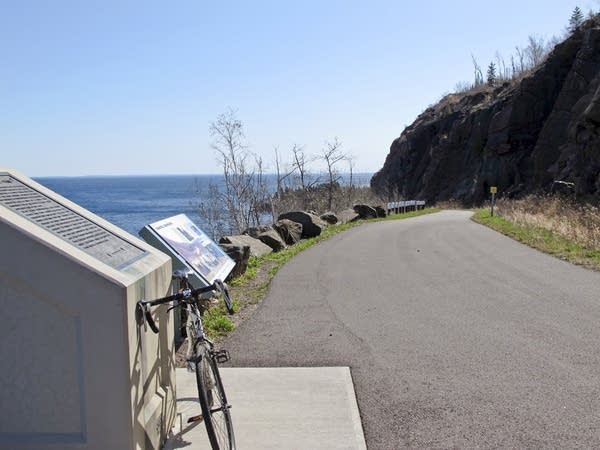Lake Superior land sale irks Gitchi-Gami bike trail supporters
Go Deeper.
Create an account or log in to save stories.
Like this?
Thanks for liking this story! We have added it to a list of your favorite stories.

The Minnesota Department of Natural Resources is putting $3.3 million worth of mostly lakeshore property up for sale next week, including a parcel of land on Lake Superior's North Shore where outdoors advocates had hoped a state bike trail would be built.
The public auction of school trust fund land marks the first time most of the parcels have been on the auction block. Sale of lakeshore land had been prohibited unless the sale was approved by the Legislature, but state lawmakers in 2012 opened the door for sales of school trust fund land along lakeshores to boost funding for schools.
School trust fund land was created when Minnesota became a state, and today the DNR manages about 2.5 million acres of school trust fund land. When land is sold, the money goes into a permanent fund that earns interest and dividends, sending about $25 million to school districts each year, according to the DNR.
Although the DNR announced the auction in a press release last month, the sale of the 65-acre parcel on Lake Superior came as a surprise to organizers supporting the Gitchi-Gami State Trail that travels along the North Shore. The land is located about 10 miles north of Silver Bay and includes 1,675 feet of lakeshore. The starting bid for Wednesday's auction for the property is $809,800.
Turn Up Your Support
MPR News helps you turn down the noise and build shared understanding. Turn up your support for this public resource and keep trusted journalism accessible to all.
• View a map of the Gitchi-Gami State Trail
Without an easement that would allow for the trail to be built after the land is transferred to private ownership, there is no guarantee that that part of the trail could be built, said Brett Feldman, executive director of the Parks and Trails Council of Minnesota.
"It's a connection to a very popular trail that links the entire North Shore. You get from Two Harbors to Grand Marais," he said.
The DNR has said it would prefer the trail be built on the west side of Highway 61 instead because of safety concerns. But Feldman said not only would that part of the trail be less scenic, but the state would also have to build trail crossings on the highway and negotiate with landowners to build the segment, which could be costly. The state could decide to try to buy back some land on the lakeshore property later to build the trail, but Feldman said that would also be expensive.
Feldman, who sent a letter to DNR Commissioner Tom Landwehr this week asking that the land be pulled from the sale, said he supports the DNR's goal to sell school trust fund land but wishes the DNR would make way for the trail connection.
"We just are having trouble understanding the logic. Why this parcel? Why now? And how does selling it now before it appreciates in value contribute to the long-term economic benefit for the school trust?" he asked.
Scott Harrison, who owns Lutsen Resort and for six years headed the effort to build the Gitchi-Gami State Trail, echoed Feldman's concerns about the trail connection. Harrison said he's also concerned that the DNR's minimum bid for the land is too low.
"This is a very valuable piece of property," he said, adding that he only found out about the sale a week ago and has spoken with others on the North Shore who were also unaware of the sale. "I'm not aware of any promotional efforts that were made either to conservation groups that might want to protect it, or even to developers for that matter to get the best value for the DNR for that piece of property."
But DNR officials defended the sale, saying they reviewed each piece of land extensively before deciding to sell it. The trust fund land that's up for sale is surplus land, meaning it may be surrounded by homes and doesn't fit with the DNR's management goals, said Aaron Vande Linde, the DNR's school trust lands administrator.
"We do an analysis of what's in the best interest of the trust today," he said, explaining that even if a piece of land is expected to go up in value in the future, it might make more economic sense to sell it and have the proceeds begin earning interest and dividends. He said that was the case with the Lake Superior property.
"It was a long and thoughtful process based on legislative direction," Vande Linde said. "We made this decision because it's in the best interest of the trust, and that's our obligation as trustees."
Of the 22 properties for sale next week, Vande Linde said he expects only a quarter of them will sell, and he said he will be surprised if anyone bids on the Lake Superior parcel because of its high price.
But Rep. Jean Wagenius, DFL-Minneapolis, who in 2012 opposed giving the DNR authority to sell lakeshore trust fund lands, said she is concerned about the state giving up land for too little money.
"This feels way out of line," she said of the price, citing the state's recent multi-million dollar payouts for land along the Mississippi River and La Salle Lake in northern Minnesota. "We have been paying dearly for land with water."




